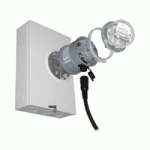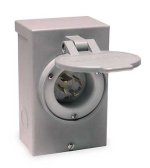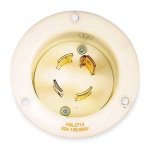Mace Canute
Elite Member
larryccf, panel boxes are designed to be customer accessible both for maintenance and for the installation of new circuits. I didn't say it wouldn't work as designed, I said it was a bad design because it allows the interlock to be removed totally just with the simply act of removing the panel cover. The other point I don't like about that system is how do you know the main breaker is actually open when you flip the lever?? The breaker is totally sealed and there is no way to check it without removing the panels covers which disables the interlock. Transfer switches are designed so that they have a visible opening that can be verified by opening the enclosure, which does not bypass the interlock function at all plus they are constructed much more robust. The chances of one failing to open the circuit to the utility when operated are slim to next to impossible. A good interlock system won't allow you to circumvent it easily, if at all.
"i've also been told that it's a common practice today, in light of the proliferation of residential generators, for lineman to disconnect & isolate a circuit before working on it "
When so many customers can be fed off one transformer, it is impractical to isolate every circuit and sometimes impossible to ABSOLUTELY KNOW FOR CERTAIN that you have them all. Circumstances enter into it. Lots of times there is just one District Officer working by himself. Most connections up the poles are crimped and if you think outages take a long time to fix now, add on the time require to isolate every service and then reconnect them all. It is NOT the responsibility of the utility to guarantee there is no backfed condition, it is the responsibility of the customer to guarantee he cannot backfeed into the utilities system.
"i'm not sure how an interlock kit, properly installed and used creates a safety hazard"
An interlock system that is so easily circumvented is by definition a safety hazard.
"both times they asked me about the interlock kit and i told them i'd made it and showed them the letter from my county bldg inspector's office approving it - both times, after inspecting it and how it functioned and was connected, neither tech from utility company said word one about the interlock kit regarding any danger to their lineman - i feel safe in assuming if they felt there was a scenario that was potentially dangerous, they'd have said something"
I have heard of and seen inspectors and techs that were less than adequate,to put it politely. If they think this is a good design, I lump them in with the "less than adequate" group for the reasons I have already listed.
"they still haven't replaced the underground cable leading up to my house meter - apparently, their words, a mole or something has broken the insulation on one leg or wire and moist soil grounds it out when it rains but it hasn't been permanent outage or occurred often enough so they've left without replacing it"
This cavalier attitude from the utility to a customer is almost unbelievable! They KNOW there is definitely a problem with their service and they won't fix it until it fails totally??? Before that happens (and it WILL happen), you will experience worse and worse problems with voltage drop on that leg to the point that appliances/equipment may burn out. If the neutral goes, a lot of stuff can be burned out on both hotlegs. Google "open neutral" to see what happens. The utility knows this can happen. They can't NOT know, it is so basic. This is the sort of thing that makes me right teed off! You can bet money that if this was the service drop to the utility personel or their friends, they would have it repaired tout de suite!
larryccf, please don't take any of this personally, it is not meant to be and I really do think you did an excellent job of copying the commercial unit. Using epoxied-in-place acorn nuts on the back prove you are thinking and trying to make it as safe as you can. I understand the desire to use something much cheaper than a regular transfer switch which I know is very expensive.
It's still not a good design!
"i've also been told that it's a common practice today, in light of the proliferation of residential generators, for lineman to disconnect & isolate a circuit before working on it "
When so many customers can be fed off one transformer, it is impractical to isolate every circuit and sometimes impossible to ABSOLUTELY KNOW FOR CERTAIN that you have them all. Circumstances enter into it. Lots of times there is just one District Officer working by himself. Most connections up the poles are crimped and if you think outages take a long time to fix now, add on the time require to isolate every service and then reconnect them all. It is NOT the responsibility of the utility to guarantee there is no backfed condition, it is the responsibility of the customer to guarantee he cannot backfeed into the utilities system.
"i'm not sure how an interlock kit, properly installed and used creates a safety hazard"
An interlock system that is so easily circumvented is by definition a safety hazard.
"both times they asked me about the interlock kit and i told them i'd made it and showed them the letter from my county bldg inspector's office approving it - both times, after inspecting it and how it functioned and was connected, neither tech from utility company said word one about the interlock kit regarding any danger to their lineman - i feel safe in assuming if they felt there was a scenario that was potentially dangerous, they'd have said something"
I have heard of and seen inspectors and techs that were less than adequate,to put it politely. If they think this is a good design, I lump them in with the "less than adequate" group for the reasons I have already listed.
"they still haven't replaced the underground cable leading up to my house meter - apparently, their words, a mole or something has broken the insulation on one leg or wire and moist soil grounds it out when it rains but it hasn't been permanent outage or occurred often enough so they've left without replacing it"
This cavalier attitude from the utility to a customer is almost unbelievable! They KNOW there is definitely a problem with their service and they won't fix it until it fails totally??? Before that happens (and it WILL happen), you will experience worse and worse problems with voltage drop on that leg to the point that appliances/equipment may burn out. If the neutral goes, a lot of stuff can be burned out on both hotlegs. Google "open neutral" to see what happens. The utility knows this can happen. They can't NOT know, it is so basic. This is the sort of thing that makes me right teed off! You can bet money that if this was the service drop to the utility personel or their friends, they would have it repaired tout de suite!
larryccf, please don't take any of this personally, it is not meant to be and I really do think you did an excellent job of copying the commercial unit. Using epoxied-in-place acorn nuts on the back prove you are thinking and trying to make it as safe as you can. I understand the desire to use something much cheaper than a regular transfer switch which I know is very expensive.
It's still not a good design!



